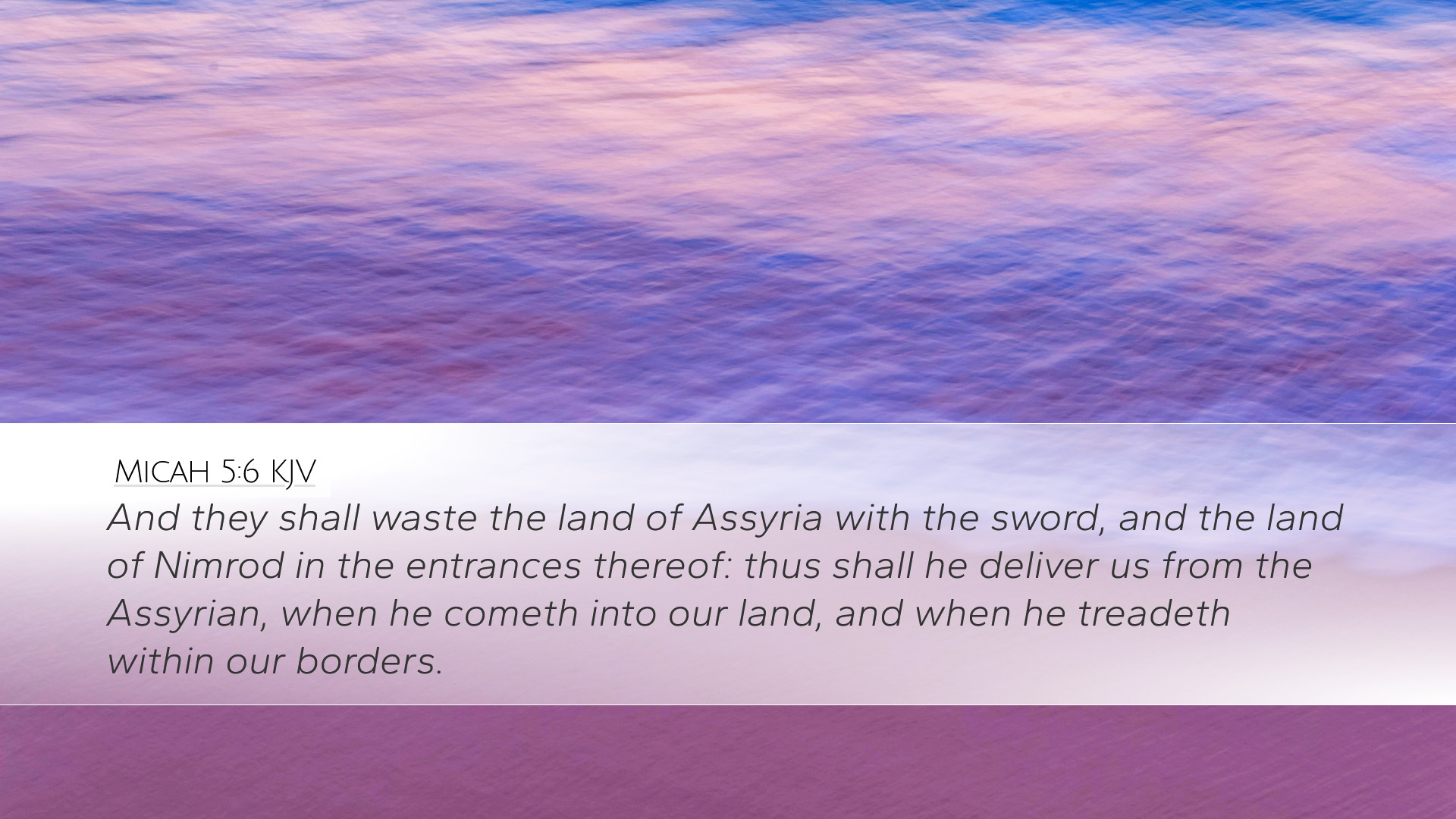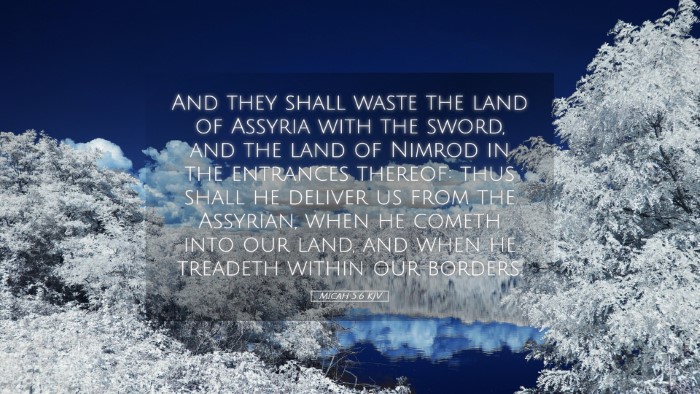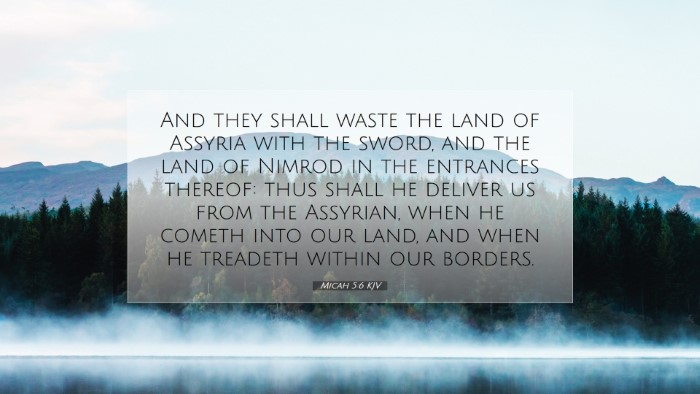Old Testament
Genesis Exodus Leviticus Numbers Deuteronomy Joshua Judges Ruth 1 Samuel 2 Samuel 1 Kings 2 Kings 1 Chronicles 2 Chronicles Ezra Nehemiah Esther Job Psalms Proverbs Ecclesiastes Song of Solomon Isaiah Jeremiah Lamentations Ezekiel Daniel Hosea Joel Amos Obadiah Jonah Micah Nahum Habakkuk Zephaniah Haggai Zechariah MalachiMicah 5:6
Micah 5:6 KJV
And they shall waste the land of Assyria with the sword, and the land of Nimrod in the entrances thereof: thus shall he deliver us from the Assyrian, when he cometh into our land, and when he treadeth within our borders.
Micah 5:6 Bible Commentary
Commentary on Micah 5:6
Micah 5:6 states: "And they shall waste the land of Assyria with the sword, and the land of Nimrod in the entrances thereof: thus shall He deliver us from the Assyrian, when he cometh into our land, and when he treadeth within our borders."
In this verse, we encounter a significant prophetic promise regarding God’s deliverance of Israel from their enemies, particularly the Assyrians. The theme is pivotal as it assures the people that despite the impending threats, there is hope rooted in divine intervention. This commentary draws upon insights from esteemed public domain theologians to illuminate its depth and application.
Contextual Background
The Book of Micah is a prophetic text addressing both judgment and hope. The immediate context of Micah 5 reflects a time of geopolitical turmoil, with the Assyrian empire posing a significant threat to Israel and Judah. Micah's prophecies often oscillate between the impending judgement due to Israel’s sin and the hope of restoration through the coming Messiah.
The Divine Warrior
Matthew Henry emphasizes that the imagery of God wastefully vanquishing the Assyrian land illustrates His role as a divine warrior who fights on behalf of His people. He states, "God will make them (enemies) desolate, and He will do so with such might that the power of the Assyrian empire will be broken comprehensively." This reflects the overarching theme in biblical prophecy where God periodically renews His covenant promises, reminding the faithful of His omnipotent presence in their struggles.
The Land of Nimrod and Its Significance
The reference to the "land of Nimrod" invites a historical and symbolic interpretation. Adam Clarke elaborates that Nimrod was the first mighty man upon the earth (Genesis 10:8) and represents a kingdom characterized by rebellion against God, primarily identified with the land of Babylon. Clarke notes, "The mention of his territory signifies the utter defeat of those empires that rise in opposition against God’s people." This reinforces the idea that no earthly power can stand against the will of God.
The Sword and Deliverance
The instrumentation of the sword in this verse denotes judgment. Albert Barnes points out that God would utilize His people as instruments of His vengeance against the Assyrians. He states, "The sword is often a metaphor for divine judgment, illustrating how God will execute justice on those who have oppressed His people." The promise of deliverance is twofold; it signifies both the spiritual and physical liberation of God’s chosen, aiming for a holistic restoration.
The Assyrian Threat
Within this prophetic declaration, there lies an acknowledgment of the Assyrian threat. Micah notes that the dangers are imminent, portraying a realistic view of the socio-political landscape— yet coupled with the assurance of divine deliverance. The phrase "when he cometh into our land, and when he treadeth within our borders", refers to an invasion that parallels the historical realities faced by Israel. Henry provides consideration of such threats, noting, "Though we see the enemy encroaching, we must remember that God ordains their defeat."
Theological Implications
Theologically, Micah 5:6 offers crucial insights pertinent to ecclesiology and soteriology. It speaks to God’s sovereignty over nations and His protective hand over His people. Furthermore, it anticipates the ultimate deliverance that will culminate in Christ, the true shepherd of Israel. Clarke asserts, "This promise foreshadows the coming of Christ, the one who will defeat enemies of both flesh and spirit, extending deliverance to all who believe." The text powerfully foreshadows a moral and spiritual call to dependence upon God amid adversity.
Conclusion
Micah 5:6 serves as a beacon of hope for the faithful, encapsulating the prophetic assurances of deliverance from oppression and God’s sovereign ability to protect His people. The combined wisdom of commentators like Henry, Barnes, and Clarke invites readers to reflect on the nature of divine intervention, the seriousness of divine judgment, and the ultimate victory through Christ. It encourages a perspective of hope rooted in the certainty of divine action rather than fear of earthly powers. As pastors, students, and theologians engage with this passage, it beckons them not only to study the historical context but to embrace the timeless truth of God’s redemptive plans.


